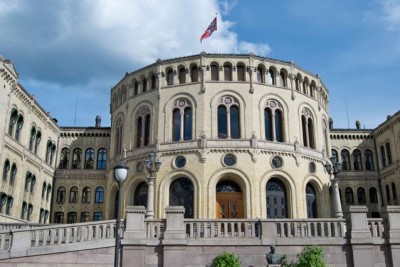A political drama at the Parliament this week finally ended with a new package of measures meant to help stop climate change. The Labour-led drama left one of Norway’s biggest parties, The Progress Party (Fremskrittspartiet, Frp) out in the cold, but most recognized that Frp actually had played a constructive role.

Even some of the most ardent opponents of Frp, Norway’s most conservative party in parliament, agreed that Frp was badly treated by its arch-rival, Labour, and the Conservatives (Høyre), which didn’t stand up for Frp and demand they be included in the political negotiations.
Instead Frp was frozen out of the talks, even though Frp had surprised everyone by initiating some of the measures that eventually were approved by the other parties, like establishing a new research center for geothermal energy.
“It’s very good that it all resulted in a climate compromise with stronger aspects than in the initial climate package proposed by the government,” Einar Håndlykken of environmental foundation Zero told newspaper Dagens Næringsliv (DN) on Friday. “It was sad the government parties (led by Labour and its deputy leader Helga Pedersen) blocked negotiations with Frp. They had a unique opportunity to work out a wider and committed climate deal with all the parties.”
If Frp had been poised to put the brakes on a climate pact, he added, it would have been correct to freeze them out. Håndlykken acknowledged that wasn’t the situation.
“Until Frp was thrown out of the talks, they had gone along with all the demands from the other opposition parties,” he said. Håndlykken also noted that Frp has a good record on climate and environmental issues in many of the municipal governments where it’s a key player, especially in Oslo and Os, outside Bergen.

Per-Willy Amundsen, who’d been leading Frp’s climate negotiations with the opposition, called the week’s drama “climate chaos” and accused Labour of carrying out carefully orchestrated political tactics to rob Frp of the credit it deserved. “It seemed like political tactics were more important than arriving at united and reasonable climate policies,” Amundsen said. He was also disappointed that the Conservatives, a potential government partner for Frp if both parties do well in the next national elections, “let themselves be used by Labour in the political tactics.”
Jan Tore Sanner, deputy leader of the Conservatives, avoided mention of Frp in the pact worked out with Labour, mentioning only the other much smaller opposition parties, the Liberals (Venstre) and the Christian Democrats. He told DN, however, that it was “unreasonable” that Frp was frozen out by Labour. “And you can also see that proposals offered by Frp are now in the negotiated result,” Sanner conceded.
There have been reports that some opposition politicians have apologized to Amundsen and other Frp politicians, and some media commentators were contending on Friday that Frp actually emerged as a winner with Labour and Helga Pedersen losing respect. Most everyone except Pedersen and Labour suggest Frp played a constructive role after years of questioning climate change.
As for the climate pact itself, it calls for the quicker establishment of a climate technology fund, fueled by NOK 10 billion during 2013, along with clear incentives for increased use of and more state funding for public transport.
It also demands more funding for a research center for environmentally friendly energy, establishment of the new Frp-initiated research center for geothermal energy and faster progress in construction of intercity train connections in and around Oslo.
The pact also orders prohibition of all oil-based heating in public buildings by 2018 and in homes by 2020 through support programs, plus a new strategy for use of biogas, and construction of at least one full-scale demonstration facility for capture and storage of carbon emissions by 2020.
The goal with all this is for Norway to dramatically reduce carbon emissions at home, instead of relying on funding emissions cuts programs abroad.
Views and News from Norway/Nina Berglund
Please support our news service. Readers in Norway can use our donor account. Our international readers can click on our “Donate” button:

